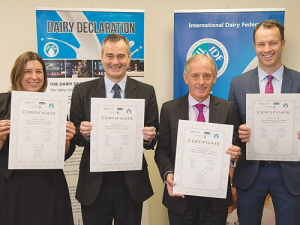State of the Dairy Nation 2024/25: DairyNZ Highlights Record Milk Production and Export Growth
DairyNZ's chief executive Campbell Parker says the 2024/25 dairy season reinforces the importance of the dairy sector to New Zealand.
 Industry leaders from left, Kimberly Crewther (DCANZ), Jeremy Hill (IDF), Martyn Dunne (MPI), and Tim Mackle (DairyNZ)
Industry leaders from left, Kimberly Crewther (DCANZ), Jeremy Hill (IDF), Martyn Dunne (MPI), and Tim Mackle (DairyNZ)
The dairy industry has endorsed an international agreement on global sustainable dairy development.
DairyNZ, Dairy Companies Association of New Zealand (DCANZ) and the Ministry for Primary Industries (MPI) have endorsed the Dairy Declaration of Rotterdam. It commits towards feeding the world with safe and sustainable products, and enhancing sustainability.
The signatories are the International Dairy Federation (IDF) and the UN Food and Agricultural Organisation (FAO), who signed the declaration during the World Dairy Summit in 2016.
“We are pleased to endorse the declaration today as a signal of strong support for the UN 2030 Agenda for Sustainable Development and for the important role of the dairy sector in the global community’s efforts toward sustainable development,” says Kimberly Crewther, executive director of DCANZ.
“We look forward to working with all IDF and FAO members to deliver the outcomes in the declaration and its sustainable development goals.”
The declaration highlights areas in which dairying can move to achieve its sustainable development goals from an economic, social, environmental and health perspective, all priorities for NZ. This includes working together on ways to build capacity to develop sustainable food systems and resilient agricultural practices.
“NZ is engaged in collective global efforts to promote the efficient use of natural resources and combat climate change, such as the Global Research Alliance on Agricultural Greenhouse Gases and the Global Dairy Agenda for Action,” says MPI director-general Martyn Dunne.
DairyNZ chief executive Tim Mackle welcomes the support expressed in the declaration to meeting the needs of farming families.
“The declaration also recognises the major economic contribution dairy makes to realising the sustainable development aspirations of farmers and communities worldwide.”
NZ seeks to eliminate distortions from global agricultural markets, such as subsidies and trade barriers that can hamper food security, prevent farmers from receiving the full value of their products and raise food costs for consumers.
“Dairy remains one of the most protected and distorted sectors of global trade,” says Crewther.
“We also welcome the declaration’s focus on the social and health dimensions of dairy and its role in a balanced, nutritious and healthy diet.
“As a leader in the production of safe and sustainable dairy nutrition we support the global development of science-based standards, policies and practices for food safety and improved health outcomes.”
Recent weather events in the Bay of Plenty, Gisborne/Tairawhiti, and Canterbury have been declared a medium-scale adverse event.
DairyNZ's chief executive Campbell Parker says the 2024/25 dairy season reinforces the importance of the dairy sector to New Zealand.
A New Zealand agribusiness helping to turn a long-standing animal welfare and waste issue into a high-value protein stream has won the Australian dairy sector's top innovator award.
OPINION: A bumper season all around.
Dairy Women's Network (DWN) has announced that Taranaki dairy farmer Nicola Bryant will join its Trust Board as an Associate Trustee.
Rural Women New Zealand (RWNZ) says it welcomes the release of a new report into pay equity.
OPINION: Staying with politics, with less than nine months to go before the general elections, there’s confusion in the Labour…
OPINION: Winston Peters' tirade against the free trade deal stitched with India may not be all political posturing by the…